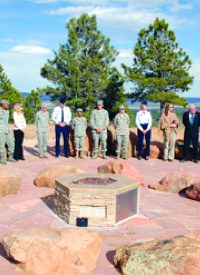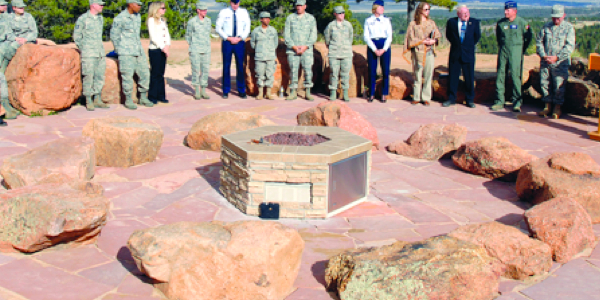
There was a time when exorbitant military expenditures were symbolized by the $640 toilet seat. But the Cadet Chapel Falcon Circle certainly surpasses such examples on account of its absurdity. While the Air Force is attempting to justify the creation of a hilltop worship sight for pagan recruits on the basis of religious pluralism, in fact, the pagans who are supposed to be served by the availability of such a "circle" are almost nonexistent — at least at this point. As Jenny Deam wrote in a Los Angeles Times article (“Air Force Academy adapts to pagans, druids, witches, and Wiccan”), even the academy admits pagans make up what must be the smallest religious minority at their institution:
Their ranks are slim. According to the academy's enrollment records, only three of 4,300 cadets identified themselves as pagans, followers of an ancient religion that generally does not worship a single god and considers all things in nature interconnected.
Still, the academy this year dedicated an $80,000 outdoor worship center — a small Stonehenge-like circle of boulders with propane fire pit — high on a hill for the handful of current or future cadets whose religions fall under the broad category of "Earth-based." Those include pagans, Wiccans, druids, witches and followers of Native American faiths….
For the record, there are no witches among the cadets this year. But the two spiritual leaders for all Earth-based religions — one a civilian, one an Air Force reservist — are witches and regularly cast spells, which they say is not so different from offering prayer. There also are no druids this year. But there could be next year.
Maj. Darren Duncan, the chaplain in charge of all the “faith communities” at the academy, adamantly insists that the presence of the Cadet Chapel Falcon Circle is not simply about religious “toleration.” Thus Jenny Deam explains:
This is not about religious tolerance — a phrase Duncan, a Christian, rejects as implying that the majority religion is simply putting up with the minority. He calls it a 1st Amendment issue. If the military is to defend the Constitution, it should also be upholding its guarantee of religious freedom. "We think we are setting the standard," Duncan says.
 Despite Duncan’s defense of the new "circle," even he would have to admit that witches and pagans make up a tiny fraction of one percent of students at the academy. According to the Los Angeles Times, there are 11 Muslim, 16 Buddhist, 10 Hindu, and 43 atheist cadets at the academy this year, and they are apparently served merely by converting chapel space to accommodate their various needs (or perceived lack thereof, as far as the atheists are concerned). It is hard to imagine Duncan arguing that each Christian denomination should be afforded chapels of their own — and surely Roman Catholics, Presbyterians, Lutherans, Methodists, and Baptists (to cite just a few examples) could all boast far more than three cadets each? And what about divisions within each of these groups? Will adherents of the Polish National Catholic Church be given one chapel, and Roman Catholics another? What about Southern Baptists and American Baptists? Each of these divisions — and hundreds more — represent a “1st Amendment issue,” in Duncan’s phraseology.
Despite Duncan’s defense of the new "circle," even he would have to admit that witches and pagans make up a tiny fraction of one percent of students at the academy. According to the Los Angeles Times, there are 11 Muslim, 16 Buddhist, 10 Hindu, and 43 atheist cadets at the academy this year, and they are apparently served merely by converting chapel space to accommodate their various needs (or perceived lack thereof, as far as the atheists are concerned). It is hard to imagine Duncan arguing that each Christian denomination should be afforded chapels of their own — and surely Roman Catholics, Presbyterians, Lutherans, Methodists, and Baptists (to cite just a few examples) could all boast far more than three cadets each? And what about divisions within each of these groups? Will adherents of the Polish National Catholic Church be given one chapel, and Roman Catholics another? What about Southern Baptists and American Baptists? Each of these divisions — and hundreds more — represent a “1st Amendment issue,” in Duncan’s phraseology.
The apparent favoritism for paganism that is being demonstrated at present is all the more bizarre, when only a few years ago, while Governor of Texas, George W. Bush declared that he did not believe Wicca was even a valid religion: “I don't think that witchcraft is a religion. I wish the military would rethink this decision.” Now it would appear that the military is rethinking that classification — and awarding Wiccans and pagans with a privileged status vastly beyond their actual representation in the military.
According to a story for the London Telegraph, the Air Force may have built the pagan "circle" with the intention of actively recruiting Wiccans and pagans:
The air force says the site is to help to protect the constitutional right to religious freedom.
But some think it is an attempt to attract more Wiccans to the army.
"Many men attracted to wicca are also attracted to this fantasy of the ancient warrior who is spiritually adept, but also a great fighter," Margot Adler, a renowned witch and broadcaster, said.
The American Religious Identification Survey estimated that there were 700,000 pagans and wiccans in the US.
Adler’s opinions regarding the intentions of the military are hardly inconsequential; in fact, the 2001 edition of the U.S. Army handbook for chaplains declares that one of her books is “the best general survey of the Wiccan and neo-Pagan movement.” The actual number of Wiccans in the military is currently quite small; according to a report several years ago, the Pentagon counted 1,511 Wiccans in the Air Force and 354 in the Marines. Thus, even though there are few self-identified atheists in the armed forces, there are still far more atheists than pagans in the various branches of the U.S. military. The establishment of a pagan "circle" at the Air Force Academy may change that situation.
And the Cadet Chapel Falcon Circle adds new significance to the question posed by former Congressman Bob Barr: "What's next? Will armoured divisions be forced to travel with sacrificial animals for Satanic rituals? Will Rastafarians demand the inclusion of ritualistic marijuana cigarettes in their rations?"
What is certain is that the Air Force has now spent $80,000 at a time of inconceivable deficit spending to build a chapel for pagan rituals to be performed under the auspices of the U.S. armed forces.
Photo: U.S. Air Force Academy

